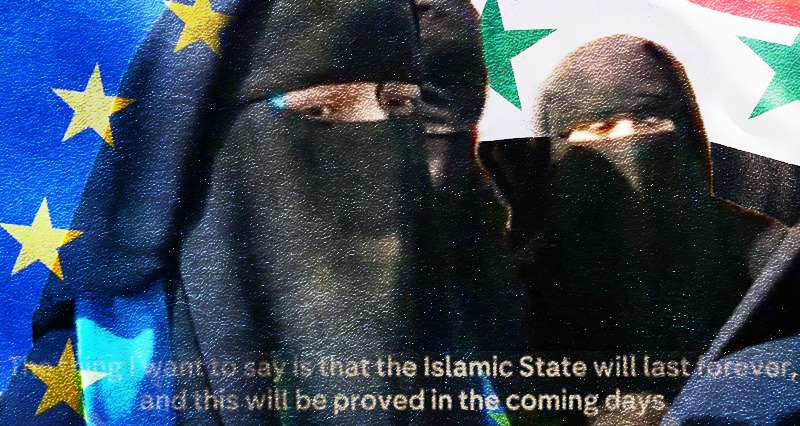US President Donald Trump threatened to release the Daesh militants if the European Union refused to take them.
“We have thousands of ISIS fighters that we want Europe to take and let’s see if they take them. And if they don’t take them, we’ll probably have to release them to Europe,” Mr. Trump said on the White House lawn on Thursday.
With numerous European countries refusing repatriation, what are the possible solutions to dealing with the detained Daesh fighters detained in Syria?

Thousands of detainees
When the Islamic State in Syria was formally liquidated (in reality, the terrorists were defeated and scattered across other territories), thousands of militants were captured by the pro-American Democratic Forces of Syria in the northern half of the country. Some (especially women with children) surrendered voluntarily.
Some 800 detainees were of European origin – the majority from France, Great Britain and Germany. They were captured when they tried to leave Syria and Iraq.
According to the declaration, the US is holding about 2,500 European militants and demanding the Europeans deal with them.
This is not the first time Trump has addressed the problem – he said something similar in February. In the event of Europe’s refusal, he threatened to simply release the terrorists from custody.
The United States is asking Britain, France, Germany and other European allies to take back over 800 ISIS fighters that we captured in Syria and put them on trial. The Caliphate is ready to fall. The alternative is not a good one in that we will be forced to release them……..
— Donald J. Trump (@realDonaldTrump) February 17, 2019
Europeans refuse to accept terrorists
The European countries, naturally, refuse to take these terrorists back in. Many countries have deprived removed citizenship for those who left their countries of origin to join Daesh, attempting to avoid responsibility for them.
These decisions were made due to risks of escape, the high cost of transportation, and, most importantly, the complex legal processes and possible acquittal by local courts.
Kurds unable to cope, Turkey on edge
The Democratic forces of Syria announced that they could not hold those they had detained endlessly. A proposal was put forth for an international tribunal to take place on the ground.
According to some reports, the Kurds are holding about 13,000 foreigners suspected of having links with Daesh (about 2,000 men and 11,000 women and children).
According to the Turkish government, the Syrian Democratic Forces, sponsored by the United States, are controlled by the YPG / PKK terrorist group in Syria. Ankara has become increasingly annoyed with the diplomatic relationship between Washington and the Kurdish militants.
Points of contention
The main issues are:
- It is difficult to separate Daesh terrorists (or accomplices) from ordinary refugees
- Many women in Daesh were captured by force and became victims, while some were ideologically charged and ready to create jihad beyond Syria. Some of these women could be preparing for a wave of terrorist attacks in Europe.
- While these detainees are being held in Northern Syria for an unknown period, a new generation of jihadists is growing. While many of the younger children are innocent, those who are older have already been indoctrinated: ISIS actively engaged in the ideological and military training of children – they were taught to handle weapons, fight, and forced to decapitate dolls with a European appearance.
- Problems of repatriation (in addition to countries being unwilling to take responsibility, there are numerous legal obstacles).
- While Daesh has more or less been defeated, adjacent terrorist networks continue to exist all over the world (many fighters having managed to escape into Iraq). In addition, new soldiers continue to be recruited on social media sites.
Ambassador James Jeffrey, a State Department envoy, said that the “Islamic State” remains a global threat, despite the loss of the once huge territory it held in Syria and Iraq. State Department counterterrorism coordinator Nathan Sales noted that “the ISIS brand lives on around the world.”
#Daesh recruiting women for terrorist attacks, Iraqi intelligence service warns https://t.co/fZ0Xik3FuI#Syria #Iraq pic.twitter.com/HuKYDOWhvg
— Press TV ???? (@PressTV) August 4, 2019
The bombings of churches and hotels in April 2019 in Sri Lanka prove that the ideology of jihad is still flourishing around the world. According to rough estimates, 45% of Daesh volunteers are from the Middle East and North Africa, 20% are from Asia, 17% are from Eastern Europe and the Caucasus, 14% are from Western Europe (mainly from France, Germany, Great Britain and Belgium) and a small percentage are from the US, Australia and New Zealand.
US created the problem, and now accuse others
Trump’s statement about releasing the terrorists was intended at shaming and intimidating Europe. Of course, the president is not going to let crowds of Daesh fighters onto the streets of European capitals — rather, Trump’s threat was an expression of irritation designed to push European countries to repatriate their citizens.
However, It is no secret that the United States has become one of the main culprits in the formation of ISIS in the first place. Al-Qaeda arose from US training and equipping terrorists in Afghanistan to fight the USSR (a fact explicitly stated by none other than Hillary Clinton), many of whom went on to fight in other radical groups across the middle east. An official report by the US Department of Defense acknowledges its role in fostering the Islamic State to fight against Assad’s government in Syria.
The US’ actions also created the basis for the European migration crisis as refugees from terrorism fled to Europe.
On the one hand, Trump is trying to break the globalist project of the “Great Middle East”, on the other, his administration adheres to the US’ classic strategy of “saving the world from terrorism” by strengthening its position across the world – including in Africa, where the United States has announced a push for international cooperation against ISIS.
The coalition led by the United States is completely illegitimate in the Syrian Arab Republic, as it does not have the appropriate mandate of the UN Security Council or the consent of the authorities in Damascus.
Possible solutions to the ISIS prisoner crisis
Deprivation of citizenship
As we noted above, several European countries simply refused to repatriate terrorists to domestic courts, depriving suspected ISIS members and their families of citizenship. In February of 2019, Shamima Begum was stripped of her British citizenship in a case that became notorious. The young woman went to Syria to join Daesh and later tried to return home with a child.
While this helps a single country ignore the problem, it aggravates it on a global level. The refused prisoners will sooner or later run away from the camp, or become the responsibility of another power.
Deprivation of citizenship in itself does not address the core problem.
Watch the moment #ShamimaBegum is shown the letter from the Home Office that revokes her British citizenshiphttps://t.co/n3R7NWEunA pic.twitter.com/MeXzrLR1n5
— The Telegraph (@Telegraph) February 20, 2019
Send them to court in Syria or Iraq
In a formal sense, it would be logical to give the terrorists over to the courts in Syria or Iraq. In the case of Iraq, there had even been offers to judge foreign prisoners from the Islamic State, provided that the US coalition would reimburse the estimated$ 2 billion in costs. However, the main problem with this version is not money, but Iraqi law, where the death penalty is officially authorized. Western countries, despite refusing to solve the problem, also want to prohibit Iraq from doing so, claiming the potential outcome is inhumane.
A similar problem complicates sending them to Syria. In addition to the stories about the alleged use of chemical weapons, the Syrian government has been accused of cruel treatment of prisoners, including torture. The Syrian government is accused of many of the atrocities which took place during the war with ISIS, which is why Europe is hesitant to allow them to handle the problem.
Pay the Kurds to maintain the camps
Proposals were made to fund the Syrian Democratic Forces for the maintenance of the camps. However, who would agree to pay such incredible sums indefinitely? America does not want to do so, as Trump’s statements indicate.
Turkey is against further financing of the SDF since it is contrary to their geopolitical interests.
International Tribunal
There are few precedents for large-scale international tribunals given special international crises (some examples being Nuremberg, Rwanda, Yugoslavia, Iraq). In addition, those courts formally accused people of war crimes, whereas the Islamic State has a cell-based structure which does not fit into typical military categories. If the tribunal does move forward, Daesh participants may be categorized as “enemies of humanity.”
The international community could conceivably declare all members of designated terrorist organizations to be hostis generis humani—enemies of humanity—a designation applied to pirates on the high seas and slavers centuries ago. People in this category stand outside the normal protections of the law and can be dealt with by any nation.
Aside from the complexity of organizing the process, formal legal problems remain – in particular, the ICC (International Criminal Court) is not recognized in the United States. Plus, the question remains, can citizens of other countries be judged in a neutral territory without prior trial in their homeland?
These questions have severely complicated focusing on a tribunal as a solution.
The danger remains
Meanwhile, while Western countries are unable to agree on the camps and stubbornly refuse to recognize the legitimate government of Bashar al-Assad, which could solve at least solve the problem in part, terrorist attacks continue throughout the world. The threat is only increasing with the return of Daesh members from Syria. Those fighters who were not captured returned home to Europe to launch the bloody terrorist campaigns in Belgium and France from 2015 – 2016, including the terrorist attacks in Paris on November 2015, and in Brussels on March 2016. These attacks were not carried out by ordinary Muslims, but by fighters connected to the Islamic State.
https://twitter.com/MerckVossen/status/857738565555539968
Although the number of terrorist attacks peaked between 2015–2016, many are now being committed by single criminals using primitive tactics (like cars driving into a crowd). The attacks in Sri Lanka in April 2019, in which more than 250 people died, again demonstrated that the terrorist campaign inspired by the Islamic State continues at a global level. ISIS’ websites continue to promote terrorist ideas, the organization regularly takes responsibility for terrorist attacks and recruitment is ongoing worldwide.
This is a concern not only for Europe but Turkey as well, which is suffering from an influx of migrants. At the official level, Ankara has an “open borders” policy… but, among the population, there is increasing discontent and anxiety about the arrival of refugees. Around 3.6 million registered Syrian refugees currently reside in Turkey, but by July 2019, more than 177,000 illegal migrants had been detained in the country (from Syria, Afghanistan, Pakistan, Morocco, Bangladesh, Uzbekistan, Sri Lanka and Algeria). Interior Minister Süleyman Soylu estimates that by the end of 2019, this figure will reach 300,000.
Erdogan’s government is naturally concerned about the situation in northern Syria – which helps to explain a recent statement by the Turkish president about a new military operation being launched in the region (importantly, the effort is being made in coordination with the US and Russia).
Thus, the future of entire continents depends on countries cooperating to find a solution to the issue. If the West continues to obstinately rely on classic liberal-humanist values (in which even ISIS militants must be spared from the death penalty), we may never clear this impasse. Ironically, the failure of these liberal values is what pushed many Europeans to join these radical groups in the first place.

















Leave a Reply